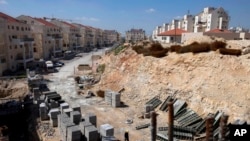An Israeli human rights group on Sunday vowed to continue its battle against Israel settlements built on occupied lands sought by the Palestinians, rejecting a harsh rebuke by Prime Minister Benjamin Netanyahu.
The Israeli leader accused B'tselem of joining a "chorus of slander" against Israel, after the rights group urged the U.N. Security Council to take decisive action against settlements. His condemnation was the latest in a series of criticisms and threats against dovish rights groups by Netanyahu's hard-line government.
B'Tselem joined American Friends of Peace Now, the U.S. affiliate of an Israeli anti-settlement watchdog, at Friday's informal Security Council session.
Hagai El-Ad, executive director of B'Tselem, told the meeting that with the 50th anniversary of the 1967 war approaching next year, "the rights of Palestinians must be realized, the occupation must end, the U.N. Security Council must act, and the time is now."
Late Saturday night, Netanyahu accused the group of making "false claims" and said he would remove B'Tselem from a list of organizations where Israelis can do national service in lieu of mandatory military service.
Netanyahu repeated his belief that settlements are not a root cause of conflict with the Palestinians. He said attacks against Israel go back long before Israel captured the West Bank and east Jerusalem in 1967, and that the conflict is rooted "in the continuous Palestinian refusal to recognize a Jewish state in any borders."
Israel captured the West Bank and east Jerusalem, with its sites holy to Jews, Muslims and Christians, along with the Gaza Strip in the 1967 Mideast war and began building settlements soon after. While Israel withdrew from Gaza in 2005, about 600,000 Israelis now live in the West Bank and east Jerusalem, in addition to roughly 2.5 million Palestinians.
Palestinians demand these territories, along with Gaza, for a future state. They view Israeli settlement construction as a major obstacle to statehood, a position that has wide international support.
B'Tselem responded to Netanyahu's remarks on Sunday, saying that "unlike the prime minister and his slander, we believe that the Israeli public is worthy of meaningful discussion of the occupation."
"But the prime minister has no answers for the Israeli public, so instead he tries to go after B'Tselem," it added. "This will not deter us, nor the hundreds of thousands in Israel who oppose the occupation."
The view on settlements is shared by many Israelis. But by taking the stand at the U.N., B'Tselem angered many at home, especially after a resolution by the U.N. cultural agency last week that Israel said denied the Jewish connection to holy sites in Jerusalem. Israel has long contended the U.N. is biased against it.
Netanyahu's government is dominated by West Bank settlers and their allies, and his coalition has repeatedly pushed legislation apparently aimed at curbing the power of dovish rights groups like B'tselem, drawing accusations from critics that it is trying to stifle dissent.
Veteran columnist Ben Caspit criticized B'Tselem's tactics, saying it risked antagonizing the public. But he said what it had done was not "treason."
"What Netanyahu is doing is questioning the legitimacy of these organizations, just as he questions the legitimacy of journalists who criticize him," he wrote in the Maariv daily. "That is incitement, and in the current mood, it is liable to be dangerous."








